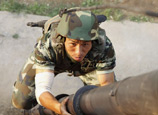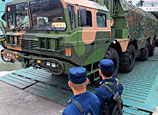
China disclosed two pieces of information on cutting-edge military technology successively last weekend: the successful test flight of the Y-20, China’s first independently-developed large transport aircraft, and the successful test on land-based mid-course missile interception technology within its territory once again following the test in 2010.
It is of great significance for China to take the initiative to successively disclose new national defense technology and equipment that are still under development and test. A Chinese military observer told reporters with the Xinhua that this was China's latest move towards greater military transparency which showed China's self-confidence.
Over the years, China has also revealed sophisticated military technology and equipment that were still under development and test for many times.
For example, China successfully conducted a land-based mid-course missile interception technology test within its territory on January 11, 2010; successfully carried out the trial sail of its first aircraft carrier (now as we know the "Liaoning ship") in August 2011; and successfully realized the take-off and landing of the J-15, China's first carrier-borne fighter, on the deck of its first aircraft carrier in November 2012, etc.
"The development and test of these cutting-edge military technology and equipment are consistent with China's national defense policy defensive in nature and security strategy," said Zhang Youping, director and senior engineer of the Safety Engineering Institute under the China North Industries Group Corporation (NORINCO GROUP).
"It is of no matter what kind of sophisticated military technology, weaponry and equipment we have, but when and where they are used and whom they target at. For China, they are not tools for threatening others," said Chen Zhou, researcher of the War Theory and Strategic Research Department under the Academy of Military Sciences (AMS) of the Chinese People's Liberation Army (PLA).
In the past two months, leaders of the Communist Party of China (CPC) and the Central Military Commission (CMC) have stressed the efforts to build a strong military and exhorted the military to be able to fight and win battles.
According to Maj. Gen. Peng Guangqian, deputy secretary-general of the National Security Policy Committee under the China Association of Policy Science Study, this does not mean that China replaces peace declaration with bellicose ones. To resolve disputes properly through peace talks instead of resorting to force or threatening by force at the slightest provocation is always the preferred approach to safeguarding sovereignty and territorial integrity and other national interests.
He also expressed that history has shown that to prevent war, China has to be well prepared for war. The greater combat readiness is, the less likely war will be to come, on the contrary, the weaker combat readiness is, the more likely war will be to break out.
















 A Taiwan student's adventure in Beijing
A Taiwan student's adventure in Beijing


![]()
